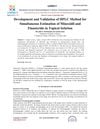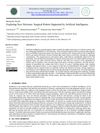 January 2024 in “Open access journal of pharmaceutical research”
January 2024 in “Open access journal of pharmaceutical research” The herbal hair oil made from natural ingredients is safe and effective for treating hair loss.
 January 2024 in “Regenerative Biomaterials”
January 2024 in “Regenerative Biomaterials” Metal organic frameworks-based scaffolds show promise for tissue repair due to their unique properties.
 January 2024 in “Polski Merkuriusz Lekarski”
January 2024 in “Polski Merkuriusz Lekarski” Pica disorder in central Iraq is mainly found in females and is linked to low iron levels; treatment with iron improves most patients.
 December 2023 in “Sains Malaysiana”
December 2023 in “Sains Malaysiana” The enzyme Rand protease works well for leather dehairing and its stability is important, with Leu75 playing a key role.
 December 2023 in “Research in pharmacy”
December 2023 in “Research in pharmacy” Phytotherapeutic compounds and supplements can help manage Polycystic Ovarian Syndrome (PCOS).
 December 2023 in “International Journal of Advanced Research in Science, Communication and Technology”
December 2023 in “International Journal of Advanced Research in Science, Communication and Technology” A reliable method was created to measure Minoxidil and Finasteride in a solution.
 December 2023 in “Research Square (Research Square)”
December 2023 in “Research Square (Research Square)” These specific gene polymorphisms are not linked to Alopecia Areata in Egyptians.
 December 2023 in “Frontiers in plant physiology”
December 2023 in “Frontiers in plant physiology” Root hairs are key for developing cereals that can fertilize themselves with nitrogen.
 December 2023 in “Frontiers in endocrinology”
December 2023 in “Frontiers in endocrinology” Excess androgens may cause PCOS, not just be a symptom.
 December 2023 in “Intisari Sains Medis”
December 2023 in “Intisari Sains Medis” SLE and DM can coexist but are rare and need careful evaluation.
 December 2023 in “Curēus”
December 2023 in “Curēus” COVID-19 vaccination does not significantly increase the risk of developing alopecia areata.
 November 2023 in “International journal of biology, pharmacy and allied sciences”
November 2023 in “International journal of biology, pharmacy and allied sciences” Banana plants have many health benefits, but more research is needed to confirm them.
 November 2023 in “Berkala Ilmu Kesehatan Kulit dan Kelamin/Berkala ilmu kesehatan kulit dan kelamin (Periodical of dermatology and venerology)”
November 2023 in “Berkala Ilmu Kesehatan Kulit dan Kelamin/Berkala ilmu kesehatan kulit dan kelamin (Periodical of dermatology and venerology)” A dermoscope helps accurately tell apart Pityrosporum folliculitis and Acne vulgaris.

Kalya Research is an AI tool that effectively finds and analyzes alternative medicine literature, saving researchers time.
 November 2023 in “Curēus”
November 2023 in “Curēus” Melatonin may help manage PCOS by improving insulin sensitivity, hormone balance, and mood.
 November 2023 in “Deleted Journal”
November 2023 in “Deleted Journal” Multimedia education greatly improves women's knowledge and management of PCOS.
 November 2023 in “Klìtinna ta organna transplantologìâ”
November 2023 in “Klìtinna ta organna transplantologìâ” MSC-derived exosomes can help treat COVID-19, hair loss, skin aging, and arthritis.
 October 2023 in “Advancement in yoga and physical therapy”
October 2023 in “Advancement in yoga and physical therapy” More research is needed before using brown fat to treat polycystic ovary syndrome.
 October 2023 in “Frontiers in endocrinology”
October 2023 in “Frontiers in endocrinology” Androgens and androgen receptors are important for metabolic health, affecting how the body uses glucose and fats through mitochondrial function.
 October 2023 in “Research Square (Research Square)”
October 2023 in “Research Square (Research Square)” Oxidative stress is linked to mild patchy alopecia areata.
 September 2023 in “Reproductive health of woman”
September 2023 in “Reproductive health of woman” PCOS is common, affects fertility, and requires personalized treatment to manage symptoms and health risks.
 September 2023 in “International journal of drug delivery technology”
September 2023 in “International journal of drug delivery technology” The herbal shampoo effectively cleans and controls fungal growth.
 September 2023 in “International journal of science and healthcare research”
September 2023 in “International journal of science and healthcare research” Genetic testing is crucial for diagnosing congenital atrichia, a rare condition causing irreversible hair loss.
 September 2023 in “International journal of Unani and integrative medicine”
September 2023 in “International journal of Unani and integrative medicine” Hair loss patterns are linked to temperament and can help diagnose it.
 September 2023 in “Journal of pharmacognosy and phytochemistry”
September 2023 in “Journal of pharmacognosy and phytochemistry” Plumbago zeylanica has valuable medicinal properties but needs sustainable cultivation methods.
 August 2023 in “International journal of research in Ayurveda and pharmacy”
August 2023 in “International journal of research in Ayurveda and pharmacy” Garudan Kizhangu Ennai may effectively treat alopecia areata but needs more research to confirm its safety and effectiveness.
 August 2023 in “Natural Resources for Human Health”
August 2023 in “Natural Resources for Human Health” Vegetarians should take B vitamin supplements to avoid health issues.

AI-assisted surgical robots improve surgery precision and safety.
 June 2023 in “MPI (Media Pharmaceutica Indonesiana)”
June 2023 in “MPI (Media Pharmaceutica Indonesiana)” A hair tonic made from kale leaves is effective for hair growth and meets Indonesian standards.

The document concludes that activating hair roots is important for improving hair growth and preventing hair loss.






























